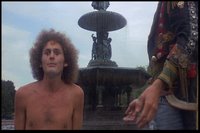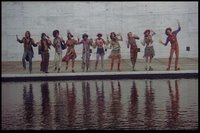 In finishing my 30-film scene guide spreadsheet, I recently revisited Godspell (1972). The film calls itself "A Musical Based Upon The Gospel According To St. Matthew", and so I have prioritised referencing Matthew’s gospel rather than Mark’s as I normally do. I've also listed the times, and the song titles are italicised.
In finishing my 30-film scene guide spreadsheet, I recently revisited Godspell (1972). The film calls itself "A Musical Based Upon The Gospel According To St. Matthew", and so I have prioritised referencing Matthew’s gospel rather than Mark’s as I normally do. I've also listed the times, and the song titles are italicised.[0 min] Prologue - (Gen 1)
[1 min] John the Baptist - (Matt 3:1-12)
Prepare ye the way of the Lord
[9 min] Baptism of Jesus - (Matt 3:13-17)
Save the people
[14 min] Fulfil the Law - (Matt 5:17-20)
[17 min] Pharisee & Publican - (Luke 18:10-14)
[18 min] Settling Disputes - (Matt 5:23-26)
[19 min] Unmerciful Servant - (Matt 18:23-35)
Day by day
[24 min] Eye for Eye - (Matt 5:38-42)
[25 min] Sheep and Goats - (Matt 25:31-46)
[27 min] Lamp for the Body - (Matt 6:23)
[28 min] Two Masters - (Matt 6:24)
Turn Back O Man
[33 min] Good Samaritan - (Luke 10:30-37)
[35 min] Giving Alms - (Matt 6:1-4)
[36 min] Rich Man & Lazarus - (Luke 16:19-31)
Bless the Lord
[42 min] Beatitudes - (Matt 5:3-12)
All for the Best
[49 min] Love your Enemies - (Matt 5:43-48)
[50 min] Parable of the Sower - (Matt 13:3-8, 18-23)
All Good Gifts
[53 min] Consider the Lilies - (Matt 6:28-30)
[56 min] Prodigal Son - (Luke 15:11-32)
[62 min] Ask Seek & Knock - (Matt 7:9-12)
[63 min] You are the Light of the World - (Matt 5:13-16)
Light of the World
[65 min] Question on Authority - (Matt 21:23-27)
[66 min] Taxes to Caesar - (Matt 22:15-22)
[67 min] Greatest Commandment - (Matt 22:34-40)
[67 min] Seven Woes - (Matt 23:1-39)
Alas for You
By my Side
[74 min] Betrayal of Judas - (Matt 26:14-16)
Beautiful City
[78 min] Last Supper - (Matt 26:17-35)
On the Willows
[84 min] Gethsemane - (Matt 26:36-46)
[85 min] Temptation - (Matt 4:1-11)
[86 min] Arrest - (Matt 26:47-56)
[88 min] Death - (Matt 27:45-50)
[92 min] Burial - (Matt 27:57-61)
Long Live God
 The first thing that is obvious from the above is that not all of the incidents and quotes come from Matthew’s gospel. In addition to two of the songs being loosely based on Psalms, a number of pieces of teaching that are included are from Luke’s gospel. This has led Richard Walsh to claim that the film is more of a version of Q than of Matthew, as it also contains no birth narratives, miracles or prophetic actions. The argument is a little more complicated than that, but even in this simplified form it’s an interesting observation. Certainly, it's one of the Jesus films with the least amount of "action", and no miracles.
The first thing that is obvious from the above is that not all of the incidents and quotes come from Matthew’s gospel. In addition to two of the songs being loosely based on Psalms, a number of pieces of teaching that are included are from Luke’s gospel. This has led Richard Walsh to claim that the film is more of a version of Q than of Matthew, as it also contains no birth narratives, miracles or prophetic actions. The argument is a little more complicated than that, but even in this simplified form it’s an interesting observation. Certainly, it's one of the Jesus films with the least amount of "action", and no miracles.Despite the ongoing popularity of the stage show, the film itself is generally poorly regarded, due to the extent to which it has dated, and the campiness of the film. One other weakness is the way which the script inadvertently breaks the natural narrative arc of the gospel story. Jesus’s confrontation with the religious authorities is depersonalized – his harshest critic is a bizarre robotic creature. The ruling authority is represented by the police, but it is unclear why they wish to see him dead, or how they manage to electrocute someone on a fence (particularly when they are not in contact with the ground). In short Jesus’s death is stripped of its meaning, and is not invested with any new meaning. He appears to die for no other reason than that is what happened in the original story.
 That said, the way the burial / resurrection is handled is far more interesting. Whilst it denies the traditional resurrection, it does visualise a more Bultmannian theory on the resurrection. For Bultmann and those who developed his theories, Jesus remained dead, but the stories of his life were carried to the people, and inspired them with his continuing presence. Here we see Jesus remain dead, but his followers literally carry his body onto the deserted streets of New York. Suddenly as they round a corner they merge into a huge crowd that has suddenly appeared. It's not my personal view of the resurrection, but it's one that has a certain degree of theological insight.
That said, the way the burial / resurrection is handled is far more interesting. Whilst it denies the traditional resurrection, it does visualise a more Bultmannian theory on the resurrection. For Bultmann and those who developed his theories, Jesus remained dead, but the stories of his life were carried to the people, and inspired them with his continuing presence. Here we see Jesus remain dead, but his followers literally carry his body onto the deserted streets of New York. Suddenly as they round a corner they merge into a huge crowd that has suddenly appeared. It's not my personal view of the resurrection, but it's one that has a certain degree of theological insight.This is one of only three films to cover the story of the Rich Man and Lazarus, the other two being Il Messiah, and The Revolutionary. It's an interesting parable, not least because many hold it was one Jesus adopted and put a twist into his adaptation, rather than an original. The setting for this parable is one of the high points of the film visually, using a long stair case which extends from an underground room, to the top of a monument. The camera shots up the steps from the rich man's point of view underground are impressive.
 This is also the only Jesus film that includes the sayings about the sheep and the goats. It is interesting, however, how the film undermines the harsh nature of the original story in its retelling. Once Jesus completes the story "the goats" to come and join the others.
This is also the only Jesus film that includes the sayings about the sheep and the goats. It is interesting, however, how the film undermines the harsh nature of the original story in its retelling. Once Jesus completes the story "the goats" to come and join the others.There are a host of Godspell sites and resources out there, both about the musical and the film. In particular, the full (musical) script (rather than just the song lyrics), and a whole host of photos.
No comments:
Post a Comment